Don’t let the new dawn be turned false

The end came as it does inevitably to all autocrats and dictators. The five-time prime minister with questionable electoral credentials, who mutated from an elected prime minister in 1996 to the worst autocrat the country has suffered, was forced out of the illegal power she had acquired in the face of a popular uprising, the tide of which no state machinery could stem.
Her deft application of the principles of CMR and her investment in the military in the 15 years of her misrule paid off. She was given a safe exit. Not only that—she, after being ferried to the nearest Indian airport, was eventually deposited in New Delhi, in a BAF C-130, where she is now happily ensconced. Her personally close connection with the Indian authorities and her over-all India policy have paid good dividends, because Delhi is likely to be her next abode for the foreseeable future, a denouement to Hasina's political career that most people had anticipated.
I feel the time is past to dwell on whether she should have left sooner and avoided the killings that she presided on. Enough it is to say that she could have, but drunk in the elixir of power, she suffered from a psychological state that all autocrats and dictators who use the state institutions to validate the usurpation of political power suffer from—a euphoria, a feeling of perpetuity, had engulfed her. She wanted to stay in power on the blood of the youths. No movements in the history of Bangladesh have taken so many lives in so few days as the quota reform movement. Even if one were to take the official count, the numbers will shame even the Kim Ill Sungs and Stalins. What is reprehensible is the attempt by ministers to put the blame on so-called miscreants, washing all responsibilities of the killings off the hand of the law enforcement agencies.
The police should be a major concern for the interim government. Hardly have I seen, if ever, the police being subjected to such public wrath. But by the same token, hardly have I seen the police act with such impunity, disregard for the rule of law and human rights. That is the inevitable outcome of a political regime's use of the state law enforcement and intelligence agencies to come to and retain power.
As reports reveal, she wanted sterner action by the army. Providence and good sense helped avoid a catastrophe whose consequence one shudders to think. All credit to the CAS for the subsequent development.
As many had predicted, Hasina's departure came through a mass uprising, the spark provided by a non-political issue that morphed into a political issue, the nine-point demand becoming a single-point demand asking for her departure. As before, this movement was also given the lead by students. No political party was capable of providing the lead, primarily because the Hasina regime over the last 15 years had unleashed such repressive and coercive measures on the opposition that it was all but neutered. However, political opposition was not the only thing that Hasina had neutered; effectively all the state institutions were made completely dysfunctional, becoming an appendage of the ruling party.
The end came in the way it did for the autocrat because of the ham-handed and amateurish way the issue of quota was handled by the advisers surrounding Hasina. Suppressing the demand by force was what they wanted, proving once again that "History is not a teacher but a warden: it does not teach anything but punishes severely for unlearned lessons." Hasina and her close cohorts and confidants didn't learn from the Pakistanis that the Bangalee spirit needs more than bullets to be suppressed.
The mistake not only cost Hasina the throne, but the nation also lost hundreds of young people who fell victim to one person's lust for eternal power that manifested in unchecked police brutality.
Unlike the cliche "the past is past," I say the past is not past. There is a lot to answer for on the part of Hasina, her party and all those elements in society that helped prop her illegal ascendancy to, and repeated usurpation of, power through the help of state agencies. I am confident that the present dispensation will go into the litany of misdeeds of the erstwhile government over the last 15 years and those responsible for the desecration of people's rights, subversion of the country's interest for partisan gains, destruction of the state institutions and machineries, crippling of the country's economy, gross violation of human rights like enforced disappearance and extrajudicial killings, and the overall breakdown of law and order, will be put in the dock. Not only the past regime, but those government functionaries who knowingly participated in persecuting the regime's plan must also be held to account.
But now, for the matter at hand.
An interim government is in place, and its members are persons with not only national and international repute but of impeccable character. But in a situation like this, no one will envy their position nor covet their job.
They have a huge task in hand, an Augean stable caused by long years of accretion of muck will have to be cleared. Every single institution will have to be cleansed: the derailed administration, the partisan Election Commission and the Anti-Corruption Commission, whose application of the rules, it is alleged, varied depending on who the alleged offender it was dealing with. Standard of application differed, depending on whether one belonged to the ruling party or the opposition.
The police should be a major concern for the interim government. Hardly have I seen, if ever, the police being subjected to such public wrath. But by the same token, hardly have I seen the police act with such impunity, disregard for the rule of law and human rights. That is the inevitable outcome of a political regime's use of the state law enforcement and intelligence agencies to come to and retain power. The police wanted its pound of flesh from the Awami League and got it, even more, by way of a carte blanche for repression and coercion.
But I have a different take on the attack on police stations following the flight of Hasina. I believe it may have been part of a well-constructed conspiracy to destabilise the country.
The job is not done. It is only the beginning. Hostile intelligence agencies are busy spreading propaganda and falsehood about the situation in the country. Creating communal strife was, I believe, an alternative plan by hostile elements to start an internal division in the country to create grounds for reversing the result of the student revolution. I am confident that Bangladesh will never see a Gujarat. All sorts of attempts to undermine the student revolution have been thwarted, but many more attempts may be on the anvil to negate the gains.
The country has witnessed a new dawn, a second independence. We must not let our guard down and allow anyone to negate our new dawn.
Brig Gen Shahedul Anam Khan, ndc, psc (retd) is a former associate editor of The Daily Star.
Views expressed in this article are the author's own.
Follow The Daily Star Opinion on Facebook for the latest opinions, commentaries and analyses by experts and professionals. To contribute your article or letter to The Daily Star Opinion, see our guidelines for submission.

 For all latest news, follow The Daily Star's Google News channel.
For all latest news, follow The Daily Star's Google News channel. 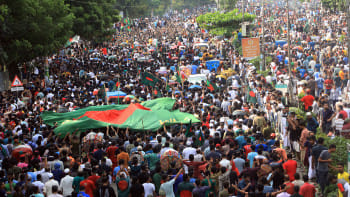
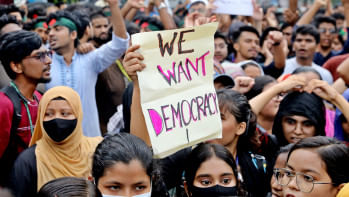




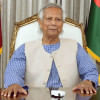

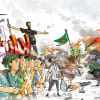
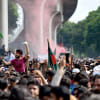


Comments